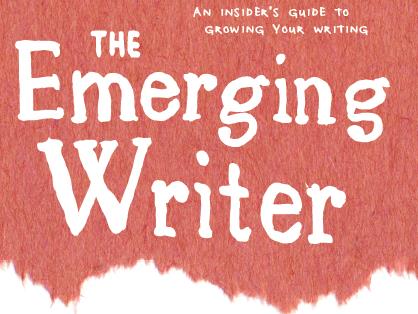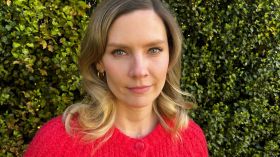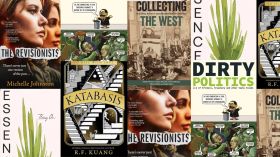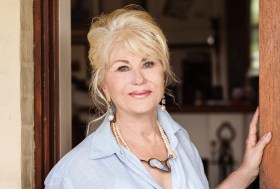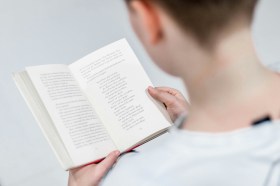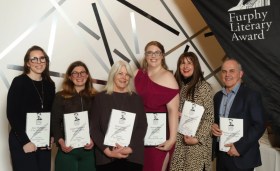Everybody knows what it means to write. But when it comes to getting food on the table of an evening, and securing a reliable income, many people are left floundering when it comes to making a decision to pursue writing as a career, and many often sniff at the financial prospects. So how does one reliably earn money from the craft? When can you begin to call yourself a professional writer, and how many different jobs can fall under this somewhat ambiguous, umbrella term?
Fortunately for us, The Emerging Writer: an Insider’s Guide to Growing Your Writing answers many of these questions and more. It is the fourth accompanying volume to the Emerging Writers’ Festival, held annually at Melbourne’s Wheeler Centre for Books, Writing and Ideas. The festival is an independent arts organisation that aims to promote and support the interests of emerging writers, which includes professional development opportunities and engagement with the public.
This book is bursting at the seams with friendly advice, engaging voices and priceless words of wisdom from a variety of creative professionals, armed with experienced within a diverse range of writing careers. It is perhaps mostly ideal for emerging writers, thus the title – or at least writers early in their professions attempting to establish a secure foothold in the industry. However, many of the discussions featured in the book are relevant to writers of varying stages in their career, and indeed much of the book is topical enough to be of interest to general creative souls possessing a mind that craves to invent, express and leap outside of the box.
Andre Dao begins with an engaging editorial suggesting that in order to flourish, writing needs to be nurtured. Along with the endearing advice to read ‘promiscuously,’ he suggests that a writer should be experimenting endlessly, and to be growing their practice like a vine – in other words, seeking out and acquiring support wherever possible. Dao mentions not to neglect the importance of criticism – and that it should be followed closely and carefully. A writer should always be able to develop a second skin. He additionally advises that it is important to secure work that brings money, and to stay connected to a world that values the arts. After all, there does exist this daunting notion of someone sitting down at a table, in their dingy run-down flat, laptop open with a blank document, mug of coffee in hand, and their brain hopelessly racked for ideas leading up to their next masterpiece. But these thoughts shouldn’t be dramatised. ‘Don’t romanticise poverty,’ Dao warns. ‘That can work when you’re young, but being old and poor is terrible.’
Charlotte Wood, a Sydney-based author of four novels and one book of non-fiction, introduces a few key lessons and pieces of advice from the wise and experienced – specifically, ‘seven enviable lines’ that every aspiring writer should be referring to as important notes of guidance. Some particularly compelling points include the significance of expressing vulnerability in the creative process – to be unashamed in writing about all that is imperfect, frail and inherently human, and how this process is able to render a stronger connection between author and reader. Wood additionally mentions the importance of living, and how vital it is to cultivate a balance between the inventive galaxy inside our minds, and the brightness outside – of real sights, smells, sounds and tastes, that keep us grounded and supplement creativity with real world experiences.
The book is delightfully versatile in that it explores the ins and outs of a variety of different writing occupations, including some of the more obscure, under-represented and taboo variations. For instance, Zane Pinner spills about how an unexpected opportunity was thrown in the midst, for writing porn scripts for a sex telephone service. He clarifies some key points for writing exciting sex scripts for an eager, anticipatory audience, and how these skills can be extended to other writing professions. Conversely, Michelle Heeter discusses her personal experience working in technical writing, elaborating on daily requirements of the job – which, according to Heeter, are an excellent way to develop and exercise skills commonly utilised in more creativity-based writing work.
Politics of the publishing world are touched upon, as are issues with writing and ethnicity, writing and racial sensitivity in Australia, writing memoirs and YA fiction, negotiating publishing contracts, getting on the digital band-wagon for self-publishing opportunities, writing and tax and the responsibilities of setting goals and pursuing work as a competitive freelancer in the digital age.
Essentially an insider’s guide to planting, cultivating and flourishing writing as a career, The Emerging Writer: an Insider’s Guide to Growing Your Writing, along with its quirky illustrations, cleanly divided sections and easy-to-read material should be a staple on the bookshelf for any aspiring writer and creative professional.
Rating: 4.5 stars out of 5
The Emerging Writer: an Insider’s Guide to Growing Your Writing
Volume 4
Written by Andre’ Dao
May 2013
221 pages
$20.00
ISBN: 978-0-9875-4810-8

